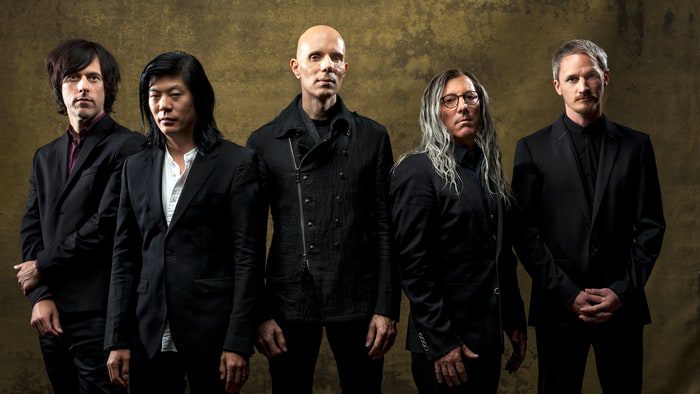
Dear Pastor Dean,
You wrote the following for Baptist News Global:
For a couple years I’ve been having an intellectual battle with atheists. Not all of them, but the people I refer to as “evangelical atheists.” They are angry and passionate and just as religiously cocksure as the fundamentalist believers they despise.
Or maybe it’s all believers they despise. To them we are all weak-minded and superstitious and pathetically out of touch. If only we’d grow up. If only we’d get an education. If only we had a fraction of their intellectual depth, we would give up our tribal, backwoodsy notions of “God.”
As you can tell, I’m a little passionate about this.
I’m not so much offended by their insulting condescension — though it wouldn’t hurt them to be a little nicer — if only for tactical purposes. As we say in the South, “You catch more flies with honey than vinegar.”
More to the point, I’m disappointed by their argument against God. While purporting to be so intellectually superior, too many atheists take on only the worst of religion. If I positioned an argument against only 5th-grade science or against those scientists who had used their knowledge to master the atomic bomb or build Internet viruses or promote biological warfare, I could make a pretty good argument against the inanity and wickedness of science, too.
So it is either disingenuous to argue only against religious fundamentalism, or it’s embarrassing for such smart people to be so uninformed about the true variety and richness of religion. Too often atheists ignore the traditions of vigorous intellectual pursuit which can be found in the theological explorations of all of the world’s religions.
To be perfectly honest, I don’t believe in the same god many atheists don’t believe in!
….
Between these two disheartening poles, angry atheists on one hand and fundamentalist Christians on the other, it’s not the muddled mush of some middle ground I’m seeking — which makes staking a claim to “free and faithful” even more difficult.
I want to take a few moments to respond to some of the things you mention in your post about angry atheists.
American atheists tend to respond to the dominant religion of their culture — Evangelical Christianity. Evangelicalism dominates everything from state and federal governments all the way down to local school boards and city councils. Groups such as the Freedom From Religion Foundation, American Atheists, American Humanists, and Americans for Separation of Church and State spend countless hours dealing with Evangelical breaches of the wall of separation between church and state. Often, these groups are forced to sue schools and governments to stop their violations of the U.S. Constitution. I live in rural Northwest Ohio, a place dominated by God, Guns, Trump, and right-wing Republican politics. The aforementioned groups could spend the next year in rural Ohio litigating church and state violations. Imagine, for a moment, being an atheist in such a place. Imagine having to sit and watch as Evangelicals trash the Constitution. Imagine not being able to find employment because many businesses don’t want to employ an atheist. Imagine a place where every officeholder is a Republican who loves Jesus, the Bible, and Friday night football. Imagine hearing of sermons where atheists are described as haters of God, child molesters, possessed by demons, and tools of Satan. Imagine being one of only a few atheists who are willing to push back against Evangelical zealots, standing in for others who fear loss of employment, family, and friends if they dare say they don’t believe. Imagine being forced to be a secret atheist lest it ruins your marriage. Imagine pretending to be a Christian and attending church so your spouse and family won’t question your beliefs and judge you harshly.
What I have described above is real life for many atheists. You might want to walk in their shoes before you slap the “angry” atheist label on them. I wonder, would you be angry if you had to live in denial of who and what you are? What if the shoe were on the other foot, and it was Christians who were treated in this manner? How would you respond then? You speak from a seat of privilege. While that privilege is increasingly being challenged, Christians still have the captain’s seat at the head of the table. Several years ago, I attended a secular coffee house concert where a Christian musician started to tell a faith-based story. She paused for a moment, perhaps pondering the appropriateness of her evangelizing, and then said, well, we are all Christians here, right? I wanted to shout, HELL NO, WE ARE NOT ALL CHRISTIANS. Instead, I mumbled something to my wife and kept quiet. The musician’s statement reflects commonly held sentiment here in Northwest Ohio. I suspect the same could be said of the South and Midwest. Jesus is the king of the hill, and if you want to be fully embraced by your community you better at least pretend to be a Jesus Club® member.
You object to atheists responding to what you call the “worst of religion.” I assume that you think your version of Christianity is a better version, and perhaps it is. You and your church are progressive socially and politically. You have many beliefs that I admire. Yes, I said admire. I’m sure we could work together in turning back Donald Trump’s Evangelical followers as they attempt to establish a theocratic government. While I am not sure of your view of the culture war, I suspect on this front too we could find common ground to work together. I am pro-choice, yet I am more than willing to work with people of faith who object to abortion for moral reasons. Unfortunately, I have yet to find a Christian willing to accept my help. Instead, I am labeled a murderer who is worthy of death.
I was an Evangelical pastor for twenty-five years. I grew up in the Independent Baptist/Evangelical church. I pastored churches in Ohio, Texas, and Michigan. I even pastored a Southern Baptist church for a time (not a pleasant experience). I am quite conversant in Christian theology, in all its shapes, sizes, and forms. Progressive Christians tend to paint themselves as different from Evangelicals. Often they are, but I have also found that if I dig a bit I will sometimes expose Evangelical beliefs at their core. For example, take the doctrine of eternal punishment. This is the one doctrine that many of my fellow atheists and I have a problem with. Not that we think there is Hell, but that there are Jesus-loving people who look at us and say, unless you believe as I do, unless you are saved by the Lord Jesus Christ, you will spend eternity in a lake of fire being tortured by God day and night. Worse yet, the God whom Evangelicals say loves everyone plans to give all non-Christians a new body after death so they can withstand endless burning and torture.
Whatever your beliefs might be, Pastor Dean, the only doctrine that really matters to me is whether you believe that I will spend eternity in Hell (or be annihilated) because I am an atheist; because I do not find the evidence for Christianity compelling. If you believe that, yes, I will spend eternity in Hell, then I have a hard time seeing you as a decent person. I am a kind, loving, thoughtful man. I’ve been married for forty-five years. I love my wife, six children, and thirteen grandchildren. While I am far from perfect, I would be more than happy to compare my good works with the best of God’s chosen ones. Yet, if there is a Hell, none of this matters. All that matters is that I have the “right” beliefs — as if Christians themselves even know what these right beliefs are. Belief in Hell, then, is the standard by which I judge Christians. If they believe only certain people will go to Heaven after death, then I have zero interest in being friends with them. Thinking your neighbor deserves to be tortured for wrong beliefs or human behaviors deemed “sinful” is offensive. Surely, you can see how atheists might become angry over Christians dismissing their lives in this manner. Granted, atheists aren’t worried about going to Hell because Hell doesn’t exist, but like most humans, we do desire to be well thought of by others. We very much want to part of the communities we live in.
Most of the atheists I know aren’t angry. They just want to live and let live. They want to live authentic lives filled with meaning and purpose (and not have Christians tell them there is no meaning and purpose in life without the Christian God). Unfortunately, literalism and certainty drive many Christians to evangelize anyone and everyone who doesn’t believe as they do, atheists included. Readers of this blog know that I am not an evangelist for atheism. I write about my past experiences as an Evangelical pastor. I also critique Evangelical Christianity, calling into question beliefs and practices they swear are straight from the mouth of God. I know Evangelicalism inside and out, and readers tend to trust my opinions. That said, I don’t care one way or the other if someone becomes an atheist. I consider any move away from Fundamentalism (and Evangelicalism is inherently Fundamentalist) a good thing. I view myself as a facilitator who helps people as they journey along the road of life. To use a worn-out cliché, it’s the journey that matters, not the destination.
My writing is widely read by religious and non-religious people, and it attracts legions of Evangelical zealots. These zealots call me names, attack my family, and even threaten me with death. These “loving” people of God are hateful and mean-spirited, some of them going so far as to attempt to hack my site or crash it with DDOS attacks. You see, Pastor Dean, your backyard has plenty of shit in it too. How about we both agree that angry Christians and angry atheists do not represent Christianity and atheists as a whole? How about we agree not to use social media as the measuring stick for determining the demeanor of Christians and atheists as a whole? I am sure that, like me, you can become angry. Anger is, after all, a human emotion. After leaving Christianity, I actually had to reconnect with my emotions. I had to learn that it was normal to be angry. What mattered is what I did with my anger. I spent fifty years dying to self/crucifying the flesh. The real me was swallowed up by Jesus and the ministry. It was refreshing, post-Jesus, to be human again. I am still in the process of reconnecting with the real Bruce Gerencser.
Rarely does a week go by where I don’t receive an email or a blog comment from Christians who think they can psychoanalyze me by reading a few blog posts. These mind readers just know beyond a shadow of a doubt that I am bitter, angry, and hate God. No matter how much time I spend responding to them or explaining myself, they still heap judgment upon my head. Years ago, I told my counselor that I was perplexed by this treatment. Here I would share my journey and answer their questions and these followers of the thrice holy God would still heap judgment and condemnation upon me. Why? I wondered. My counselor laughed and told me, Bruce, you wrongly think they give a shit about what you believe. They don’t. He, of course, was right. Evangelicals, for the most part, aren’t interested in my story or what I believe. What matters is winning me back to Jesus. What matters is winning a victory for Team Jesus®. What matters is vanquishing the atheist preacher and his “followers.”
Perhaps, by now, Pastor Dean, you can sense and understand why I might be justifiably angry if I chose to be. However, I choose not to be angry. Life is too short for me to spend it arguing with people who aren’t really interested in what I have to say. Let me conclude this post with the advice I give to everyone who stumbles upon my blog:
You have one life. There is no heaven or hell. There is no afterlife. You have one life, it’s yours, and what you do with it is what matters most. Love and forgive those who matter to you and ignore those who add nothing to your life. Life is too short to spend time trying to make nice with those who will never make nice with you. Determine who are the people in your life that matter and give your time and devotion to them. Live each and every day to its fullest. You never know when death might come calling. Don’t waste time trying to be a jack of all trades, master of none. Find one or two things you like to do and do them well. Too many people spend way too much time doing things they will never be good at.
Here’s the conclusion of the matter. It’s your life and you best get to living it. Someday, sooner than you think, it will be over. Don’t let your dying days be ones of regret over what might have been.
Please feel free to contact me if you have a question about atheists and their beliefs. You and I are never going to agree on the God question and the veracity of Christianity, but we can both do our best to understand each other. When given the opportunity, I do my best to call out atheists when they wrongly represent Christian belief. Facts matter, and atheists should be factual in their representations of Christian belief and practice. I ask that you do the same. I am considered by more than a few atheists to be too friendly with religious people. Since most people worship some sort of deity, it would be foolish for me not to be friendly to people of faith. All I ask is that religious people grant me the same courtesy.
Be well, Pastor Dean.
Bruce Gerencser
P.S. I also could have written thousands of words about how I was treated by colleagues in the ministry and former congregants after they found out l left the ministry and left Christianity. Needless to say, these so-called men of God and sanctified church members revealed for all to see the ugliness and hate that lies just under the surface of Evangelical Christianity. I find myself asking, why in the hell would I ever want to be a Christian again? Why would I want to be around people who treat people in such dehumanizing ways? Forget whether the Christian narrative is true. If Christians can’t be people of love, compassion, and peace, they have nothing to offer unbelievers.
Note
Pastor Dean’s bio states:
Russ Dean is co-pastor of Park Road Baptist Church in Charlotte, N.C. A native of Clinton, S.C., and a graduate of Furman University and Southern Baptist Theological Seminary, he earned a D.Min. degree from Beeson Divinity School. He and his wife, Amy, have been in church ministry for 30 years, and they have served as co-pastors of Park Road since 2000. He is active in social justice ministries and interfaith dialogue, and when he isn’t writing sermons or posts for Baptist News Global you’ll find Russ in his shed doing wood working, playing jazz music, slalom or barefoot water skiing, hiking and camping, or watching his two teenage boys on the baseball field.

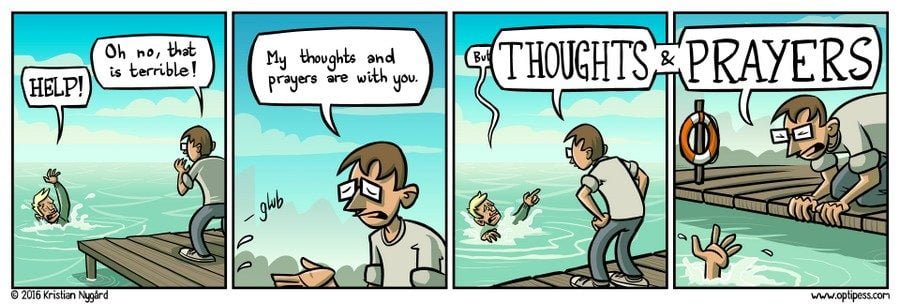
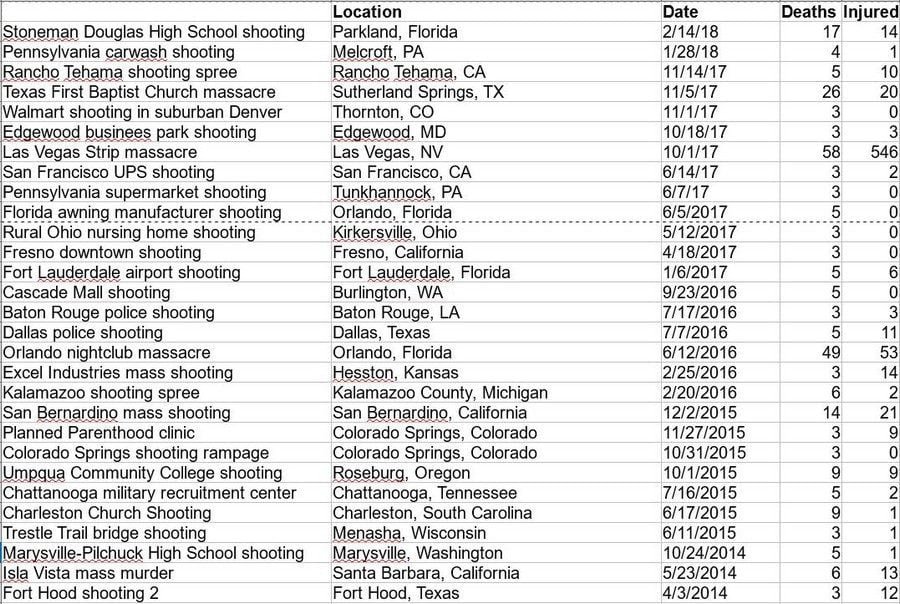
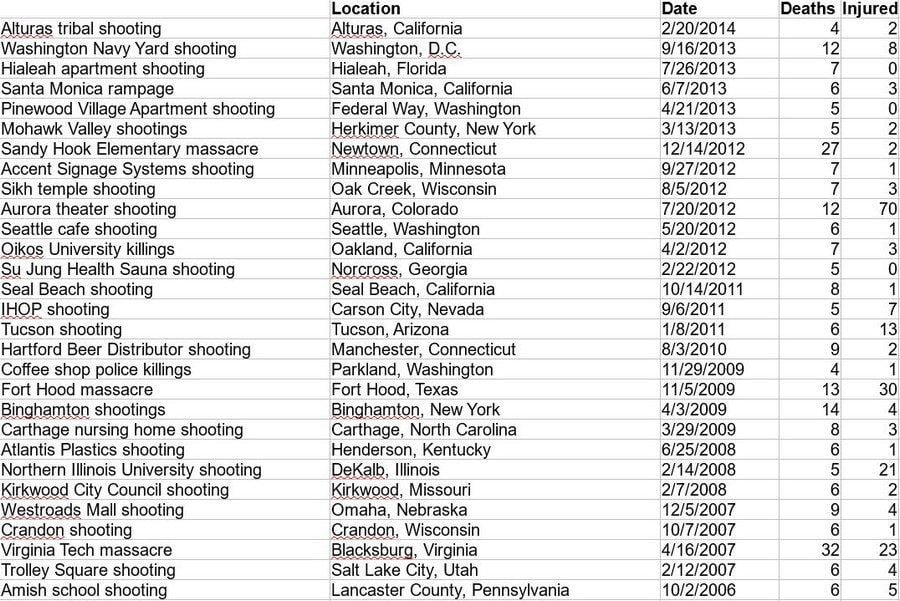
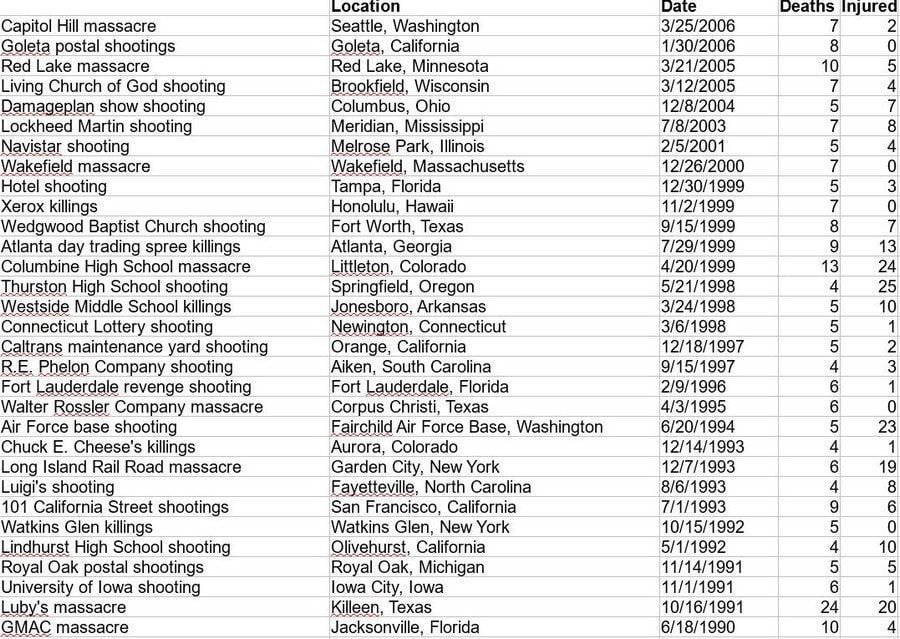
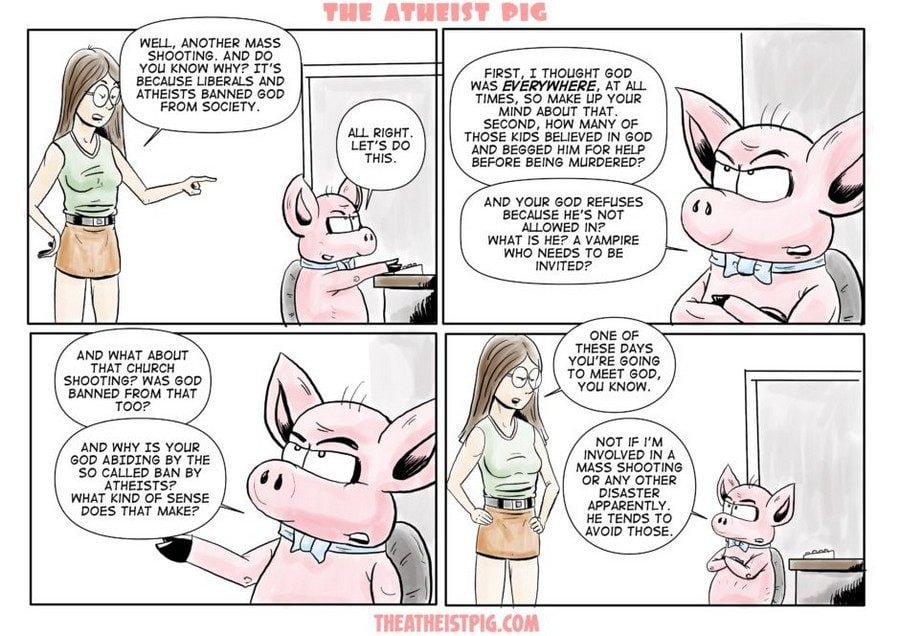 Evangelicals often claim that the reason for school shootings is that the Christian God has been banned from public schools. According to Evangelicals, all sorts of maladies afflict our society due to the fact that prayer, Bible reading, and the Ten Commandments have been litigated out of public schools. If only people would see the importance of the Christian God (and only the Christian God) in educating children and return him to his rightful place, why all sorts of societal ills would disappear overnight. The same argument is made for banning abortion, homosexuality, same-sex marriage and any of the other hot-button issues Evangelicals deem a threat to their God and way of life.
Evangelicals often claim that the reason for school shootings is that the Christian God has been banned from public schools. According to Evangelicals, all sorts of maladies afflict our society due to the fact that prayer, Bible reading, and the Ten Commandments have been litigated out of public schools. If only people would see the importance of the Christian God (and only the Christian God) in educating children and return him to his rightful place, why all sorts of societal ills would disappear overnight. The same argument is made for banning abortion, homosexuality, same-sex marriage and any of the other hot-button issues Evangelicals deem a threat to their God and way of life.

